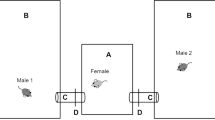Abstract
Effects of the experience of copulation and cohabitation with a pregnant female on male parental behavior were examined in ICR-strain male mice. The experience of copulation and/or cohabitation with a pregnant female promoted parental behavior, although the cohabitation with a pregnant female per se failed to inhibit infanticide in male mice. Therefore, it is possible that the facilitation of parental behavior is caused by a motivation independent from that of the inhibition of infanticide in male mice. As to the facilitation of parental behavior, the effect of copulation was stronger than that of cohabitation with a pregnant female, and these 2 effects seem to be additive. It is possible that there are 2 independent mechanisms for the facilitation of parental behavior in male mice.
Similar content being viewed by others
References
Brooks, R. & L. Schwarzkopf 1983 Factors affecting incidence of infanticide and discrimination of related and unrelated neonates in maleMus musculus.Behav. Neur. Biol. 37: 149–161.
Brown, R.E. 1986a Social and hormonal factors influencing infanticide and its suppression in adult male Long-Evans rats (Rattus norvegicus).J. Comp. Psychol. 100: 155–161.
Brown, R.E. 1986b Paternal behavior in the male Long-Evans rats (Rattus norvegicus).J. Comp. Psychol. 100: 162–172.
Brown, R.E. 1993 Hormonal and experiential factors influencing parental behaviour in male rodents: An integrative approach.Behav. Proc. 30: 1–28.
Elwood, R.W. 1977 Changes in responses of male and female gerbils (Meriones unguiculatus) towards test pups during the pregnancy of the female.Anim. Behav. 25: 46–51.
Elwood, R.W. 1980 The development, inhibition and disinhibition of pup-cannibalism in the Mongolian gerbil.Anim. Behav. 28: 1188–1194.
Elwood, R.W. 1983 Paternal care in rodents. In: R.W. Elwood. (ed.)Parental Behavior of Rodents pp. 235–237, John Wiley., NY.
Elwood, R.W. 1985 Inhibition of infanticide and onset of paternal care in male mice (Mus musculus).J. Comp. Psychol. 99: 457–467.
Elwood, R.W. 1986 What makes male mice paternal?Behav. Neur. Biol. 46: 54–63.
Elwood, R.W. & M.C. Ostermeyer 1984 Does copulation inhibit infanticide in rodents?Anim. Behav. 32: 293–305.
Elwood, R.W. & H.F. Kennedy 1991 Selectivity in paternal and infanticide responses by male mice: Effects of relatedness, location, and previous sexual partners.Behav. Neur. Biol. 56: 129–147.
Gubernick, D.J. 1990 A maternal chemosignal maintains paternal behaviour in the biparental California mouse,Peromyscus californicus.Anim. Behav. 39: 936–942.
Gubernick, D.J. & J.R. Alberts 1989 Postpartum maintenance of paternal behaviour in the biparental California mouse,Peromyscus californicus.Anim. Behav. 37: 656–664.
Jakubowski, M. & J. Terkel 1982 Infanticide and caretaking in non-lactatingMus musculus: Influence of genotype, family group and sex.Anim. Behav. 30: 1029–103
Kennedy, H.F. & R.W. Elwood 1988 Strain differences in the inhibition of infanticide in male mice (Mus musculus).Behav. Neur. Biol. 50: 349–353.
Menella J.A. & H. Moltz 1988 Infanticide in rats: Male strategy and female counterstrategy.Physiol. Behav. 42: 19–28.
Palanza, P. & S. Parmigiani 1991 Inhibition of infanticide in male Swiss mice: Behavioral polymorphism in response to multiple mediating factors.Physiol. Behav. 49: 797–802.
Parkes, A.S. & H.M. Bruce 1961 Olfactory stimuli in mammalian reproduction.Science.134: 1049.
Perrigo, G., W.C. Bryant & F.S. Vom Saal 1990 A unique neural timing system prevents male mice from harming their own offspring.Anim. Behav. 39: 535–539.
Priestnall, R. & S. Young 1978 An observational study of caretaking behavior of male and female mice housed together.Devl. Psychobiol. 11 (1): 23–30.
Soroker, V. & J. Terkel 1988 Change in incidence of infanticidal and parental responses during the reproductive cycle in male and female wild miceMus musculus.Anim. Behav. 36: 1275–1281.
Vom Saal, F.S. 1985. Time-contingent change in infanticide and parental behavior Induced by ejaculation in male mice.Physiol. Behav. 34: 7–15.
Author information
Authors and Affiliations
About this article
Cite this article
Matsumoto, F., Kimura, T. The facilitative influence of experiential factors on the parental behavior of male mice (Mus musculus): (i) The effects of the experience of copulation and cohabitation with a pregnant female. J. Ethol. 13, 23–30 (1995). https://doi.org/10.1007/BF02352559
Received:
Accepted:
Issue Date:
DOI: https://doi.org/10.1007/BF02352559




